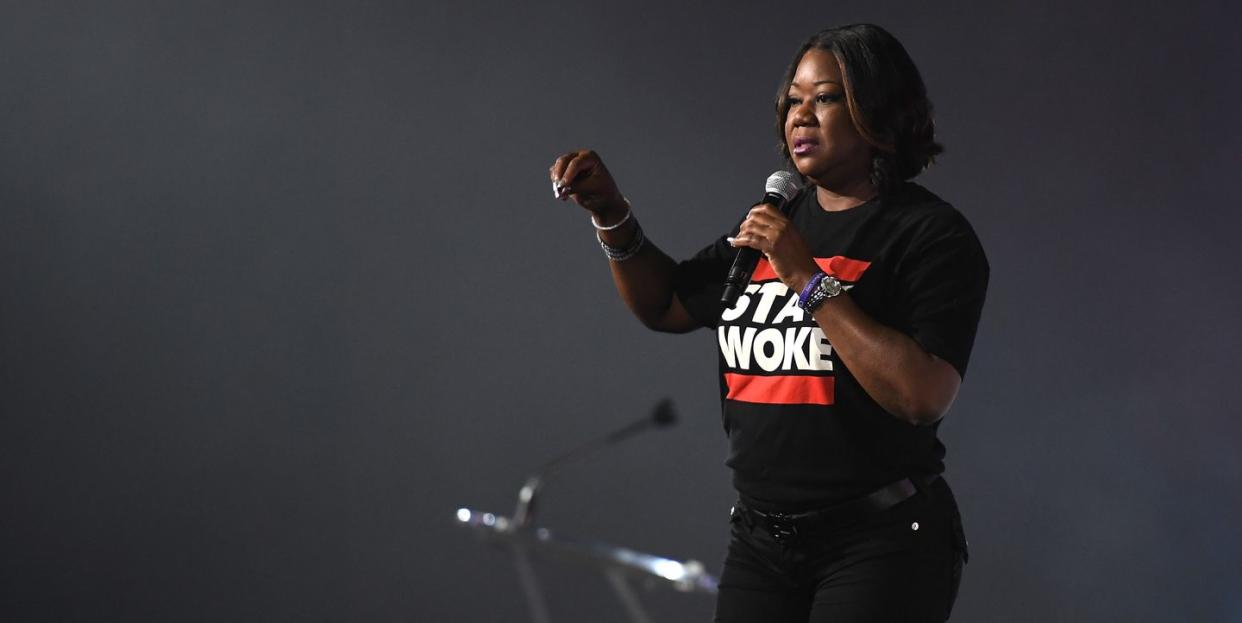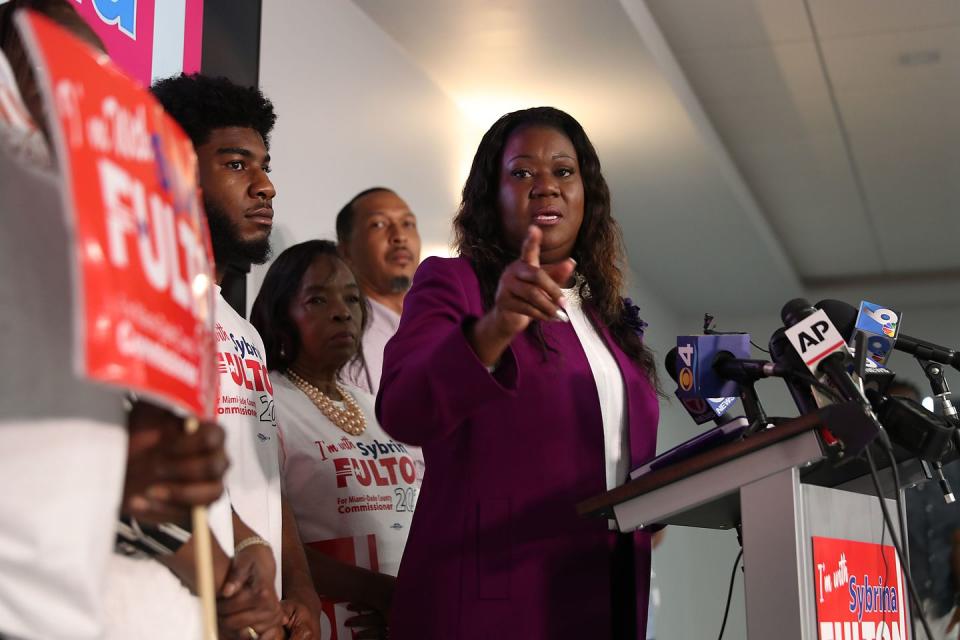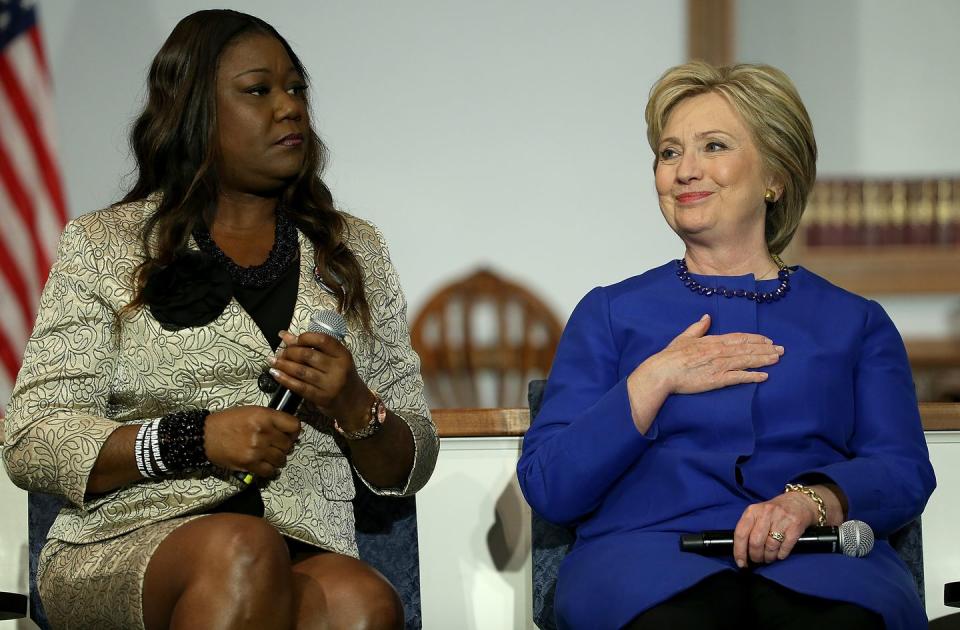Sybrina Fulton Wants to Restore Trust Between the People and Politicians

Sybrina Fulton is ready to serve Miami-Dade County.
In the years since the death of her son Trayvon Martin propelled her into the national spotlight as a public figure fighting against gun violence, Fulton has been busy. She launched the Trayvon Martin Foundation, a nonprofit that aims to end senseless gun violence, and campaigned for Hillary Clinton's 2016 presidential run.
Now, Fulton is pursuing the District 1 County Commissioner seat in Miami-Dade, where she worked for 24 years and planned on retiring before ultimately deciding to seek public office. In conversation with BAZAAR.com, Fulton discusses why she's running, how she wants to establish trust between the public and politicians, and which issues matter most to her.
What made you want to run for office?
Even though I have a national platform, my heart really is on a local level because I worked with Miami-Dade County. Before I do things on a national and international level, I want to make sure I take care of home first. Everything starts locally before it goes out through the state and in Congress or Senate and all of those different things.
I was one of those people that would be at home and complain about things that I saw, and would wonder why the politicians didn't do more. Now, I'm going to be placed in the same position where I feel like people are going to be looking at me and saying, "Okay, well, why isn't she doing this? And why is she doing that?" I just want to do the very best I can for the residents so that they can feel safe in their community, so that they can also put their trust in politicians right now. I want people to look at me and know that I'm going to work hard for them.
I worked 24 years with Miami-Dade County, so I feel connected to Miami-Dade County. I started working with them in April of 1989. I was planning to retire with them, had it not been that my son was shot and killed. I've worked in five different departments. I know the inside of Miami-Dade County by being an employee and being in a service-oriented position. I know the outside by being a longtime resident of District 1. My great-grandmother, my grandmother, my mother, and myself all live in District 1. I went to elementary school, middle school, high school, and I graduated from Florida Memorial University, right here in the district. I just feel more connected to that particular seat and that particular district.

You've talked a lot about your experience working for the county for all those years, and you also obviously have experience working as an activist. Some may still call you a rookie when it comes to entering political office. Your opponent on the other hand, Oliver Gilbert III, is the two-term mayor of Miami Gardens. What sets you apart from him?
Well, I can only speak for myself. Everybody who runs for office has to start from somewhere. When everybody started, they had no experience at all in politics. However, I've been an advocate for my son and other victims of senseless gun violence for the last eight years. This is just another level for me.
What I want to do is bring the resources back. I want to put faith back into politicians. A lot of times, people get those seats and they make all these promises. I'm not that type of person. I'm not that type of candidate that just makes blank promises and doesn't have results to show what they've done. I just believe in being connected with the people. I have a good rapport with the people. And I'm one of them.
When you talk to voters in the area, what do you hear that they most want?
They most want to feel safe in their own community. A lot of times, you go into a different area, not far from where we live in District 1, but you go to another area and you feel more comfortable there. That's because their crime rate there is not as increased as in District 1. So you feel safer in another community, and I want people to feel safe in their own community.
One of the things that I'm going to do is I'm going to educate the residents, and I'm going to bridge the gap between law enforcement and the residents and our young people. It might not be the cookie-cutter way. I'm going to step out of the box a little bit. I attended a meeting in New York where they got the people who had been previously incarcerated to talk to the residents and the young people. That may make a difference there. We gotta try something different. We have to always continue to try something different so that we can reduce those crime rates. Of course, crime and gun violence is something that I'm very passionate about. But there are some other things, like transportation, economic development.
This year has been historic for so many reasons, including the COVID-19 pandemic and the reinvigoration of Black Lives Matter protests. How do you think these major events are shaping your campaign and your priorities?
A lot of people are just realizing what's going on with police officers. I'm just really sick of people saying "good apples" and "apples," cause they're not apples. There are good officers and bad officers. So we just got to weed out those bad officers. For the most part, most police officers are professional. Most police officers are trying to do their job, which is to protect and serve. But you do have a few bad police officers that are unprofessional and that are biased and that discriminate and do all of those ugly things. And sometimes they do shoot and kill. We gotta address those issues. We can't continue to dance around it as if this is not happening, because we continue to see it. We continue to see lives lost.
I think the protests around the world came to pass, because there were so many incidents happening and nobody was being held accountable. America got a chance to see how African-Americans are being treated. With George Floyd, it was recorded, we actually saw it. And when we saw it, we couldn't take it back. There was no way that we can unsee what we had already seen. That left a big impact on people.
That's why it's so important that we say Black lives matter—not because other lives don't, but because we need to pay attention to the Black lives that are being lost.
A lot of protesters are also now demanding the defunding, if not the complete abolition, of the police. What do you make of those demands? Is that something you think that you would fight for as commissioner?
I don't actually think they want to defund. That's just a term that came up. I think a lot of people were misinformed when it came to defunding the police department, because I don't think you can find anyone that will say, "When I called 911, I don't want the police to come." They definitely want the police to come on police matters. What they're simply saying is take some of the funds from the police department and reallocate them to different areas where the police should probably not be handling anyway, such as [issues concerning] mental illness. If I call because my son is mentally ill, I don't expect the police to come out and shoot and kill him.
We recently had an incident where an eight-year-old little boy was arrested by the police. He punched the teacher in the stomach and the police came out and arrested him, put handcuffs on him, took him to the police station, and put him in a holding cell until his mom came.
We can't continue to allow this to happen. The only reason why it happened is because they had no clue what to do. That was not a police matter. He was not a threat.
You're part of the Mothers of the Movement, a group of moms who have lost their children to gun and police violence. You and some other mothers also campaigned for Hillary Clinton's presidential candidacy in 2016. What power do you think there is in using personal stories to push for reform and change?
You have to use personal stories, because they're true. Everybody uses personal issues that happened to you to propel whatever reforms that we need to have. Even now, we're talking about police reform. That's because specific incidents happened that impacted not only the person, but the family. Some of these tragedies have impacted the nation. We can't ignore them and not address it. You learn how to do things differently.
Even with the protests, I see protests looking differently now. There are more people that are out there. There are more people that are outraged. There are more people that want to get involved. They're all nationalities, all races, all religions. It's not just African-American people. That is a plus, because other people are realizing how African-Americans have been treated and are being treated, and they're standing with them just as we stand with others. That's the difference.
How did it feel to get endorsements from Hillary Clinton and other politicians like Cory Booker and Elizabeth Warren?
I was very proud. I was very appreciative. It did mean a lot. I even had a call with Hillary. It was actually two calls, one was my call and one was her call. She's really supportive, and I'm really supportive of her.

What do you most want people to know about you as they enter the voting booths (or as they fill out their absentee ballots)?
That I'll work on their behalf, that they can trust me. I'm not gonna waste their money. I'm not gonna waste their time.
I'm about educating people, and they'll be a lot more knowledgeable about the services that are offered here. They'll be more connected about contracts and different things that happen here so that they can pass it along to their family and friends. I plan on doing a lot of training, so they can understand what's going on with county government and what's being done with their tax dollars.
This interview has been condensed and edited for clarity.
You Might Also Like

